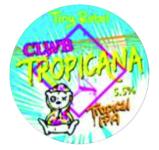Tiny troubles
An 80s reference didn’t have sufficient resonance, suggests Ciara Hughes. O/482/19 CLWB TROPICANA (Opposition), UK IPO, 16th August 2019.

In August 2017, Tiny Rebel Brewing Company Ltd (the Applicant) filed a UK trade mark application for the CLWB TROPICANA device mark (shown below) covering “beers; shandy, de-alcoholised drinks, non-alcoholic beers” in class 32. The application was opposed by Tropicana Products Inc. (the Opponent) under ss5(2)(b), 5(3) and 5(4)(a) of the Trade Marks Act 1994, based on its earlier UK and EU trade mark registrations for the TROPICANA word mark, the TROPICANA device mark (shown below) and its goodwill in the UK in relation to the TROPICANA mark.
The Hearing Officer (HO) decided in favour of the Opponent under s5(2)(b) on the basis of only the Opponent’s EUTM registration for TROPICANA, but also considered that the Opponent had established a reputation and goodwill in the UK in the fruit juice market under its TROPICANA mark, and the Applicant’s use of the mark applied for would constitute passing off.

The Applicant chose to appeal the HO’s decision to the Appointed Person (AP) only in relation to beer and, applying Meric1, the AP observed that the term “beers” encompassed non-alcoholic beers and was therefore identical to the Opponent’s non-alcoholic drinks. The AP dismissed the Applicant’s offer to limit its specification to exclude non-alcoholic beverages, which came too late in the proceedings and was inconsequential because the level of similarity found existed regardless of alcohol content.
The AP rejected the Applicant’s argument that the word TROPICANA was descriptive and non-distinctive for the goods in question based on its dictionary definition of “things associated with or characteristic of tropical regions; objects of the tropics”. While accepting that CLWB TROPICANA might be understood by some members of the relevant public as a reference to the Wham! song “Club Tropicana”.
"The AP considered it sufficient that a significant proportion of the relevant public would be confused".

The AP further held that the HO had correctly determined that the word TROPICANA played an independent and distinctive role within the mark and there was a low to medium degree of similarity between the marks. The Applicant’s appeal therefore failed.
The finding that a likelihood of confusion existed may seem surprising, given the collection of elements comprising the heavily stylised mark, only one of which correlated with the earlier mark. However, this decision demonstrates the expanded scope of protection for an earlier mark with enhanced distinctiveness and highlights the importance of the sizing and positioning of an individual distinctive element within a complex mark.
Key points:
- Stylisation and additional elements within a complex mark may not remove the risk of confusion where one distinctive element is identical to an earlier mark.
- The scope of protection for a mark with enhanced distinctiveness extends beyond the goods covered by the specification.
- Offering to amend the specification was not sufficient to dispel the likelihood of confusion between the marks.
Ciara Hughes is a Trainee Trade Mark Attorney at Bird & Bird LLP
Read more case comments
Dig deep to protect your rights
Legal dangers may lurk in online portals, as an Italian potato grower discovered, writes Nicola Ivey. C-426/24 P, Romagnoli Fratelli SpA v Community Plant Variety Office, CJEU.
Brought to heel
The EUIPO upheld Dr Martens’ position marks in a pair of cases, writes Edward Watt. 000066484/000066396, Mtng Europe Experience, SLU v Airwair International Ltd, EUIPO Cancellation Division.
Don't lose count
Much is at stake if a company fails to file its claim in reasonable time, writes Eleni Mezulanik. C-452/24, Lunapark Scandinavia Oy Ltd v Hardeco Finland Oy, CJEU.
Beyond borders
Deniz Toker on cross-border IP: when stocking in Spain becomes infringement in Germany. C-76/24, Tradeinn Retail Services SL v PH, CJEU.
Hitting the right note
A jingle judged unsuitable for a sound mark finally resonated when it went to appeal, writes Sarah Brooks. T-288/24, Berliner Verkehrsbetriebe v EUIPO, General Court.
Counting the cost
This judgment provides useful guidance on quantifying damages in trade mark infringement cases, writes Richard May. [2025] EWHC 2376 (Ch), Merck KGaA v Merck Sharp & Dohme LLC & Ors.








